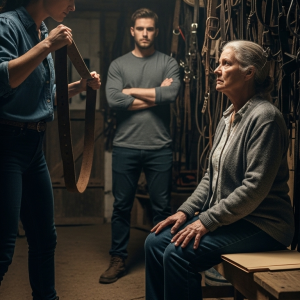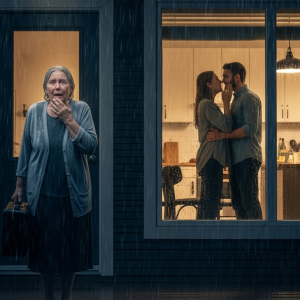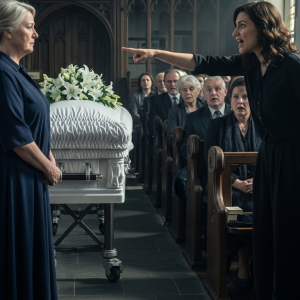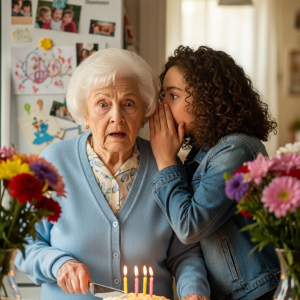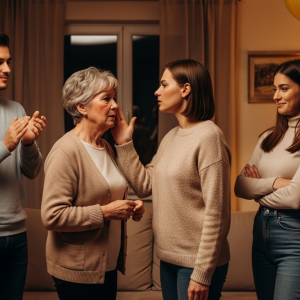My daughter-in-law hit me with a broom. My son laughed and told me not to call for help because it might upset her. I stood there, frozen. The bruise on my arm faded in a few days, but something inside me cracked wide open. I had sold my bookstore and given up everything to be with them. In that moment, I realized I had become invisible. So, I packed one bag and started walking toward a life I never thought I’d find again.
The bookstore had been my life for forty years. I held my son, Travis, in one arm and shelved books with the other. That place knew my laughter, my grief, and my beginnings. But after a small stroke last October, the doctor called it a warning. I called it a door creaking closed.
I locked the shop for the last time on a rainy Thursday. My hands lingered on the lock, as if muscle memory craved one more morning coffee among the paperbacks. That evening, I found an envelope tucked inside my unfinished manuscript. The handwriting was shaky, but it was my late husband, Allen’s.
He must have hidden it there years ago. His words were simple: If anything ever happens to me, don’t keep living for someone else’s comfort. You gave me everything. Promise me you’ll take what’s left of your story and make it yours. I had told myself I was moving in with Travis and his wife, Ellie, to simplify. But the truth was, I didn’t know what my life looked like without the daily rhythm of being needed.
Travis came the next day. As we pulled away, I looked back through the rain-blurred window at the bookstore’s faded sign. Sometimes a chapter doesn’t end with a period. Sometimes it just folds into another story. This time, it was mine to write.
The guest room was in the basement. It had no window, just a small lamp and a stiff mattress. The air smelled of damp carpet and detergent. Ellie had left a note taped to the fridge upstairs: House Guidelines. It was a neatly printed, bullet-pointed list.
Quiet hours after 9:00 p.m. No TV in shared spaces. Guests should clean up immediately after use.
The list ended with a smiley face. I found Travis in the kitchen. He gave me a sheepish glance. “Ellie just likes things to be clear,” he said. I already felt like a tenant on probation. I tried to unpack, but there was no dresser, just two plastic bins. I kept most of my things in my suitcase.
That evening, I overheard Travis in the hallway, speaking in a low voice. He mentioned “updating paperwork” and making sure everything was in place, “just in case.” Then he said the word for a will. During dinner, Ellie brought it up. She suggested a standard power of attorney and a medical directive, talking about how complicated things got when her aunt passed.
Travis added, almost as an afterthought, that I should consider drafting a new will soon. “Something clean,” he said, “that won’t leave room for confusion.” Then he passed me the salad as if we were discussing the weather. I didn’t sleep much that night. In the windowless room, Allen’s words echoed in my head: Don’t live for their comfort, live for yours.
It happened the following Tuesday. I dropped my teacup on the kitchen floor, the ceramic shattering against the tile. Before I could clean it up, I felt a sharp tap on my shoulder. It wasn’t a hand; it was the wooden end of a broomstick.
“Watch it,” Ellie said, her voice light, almost playful. She stood over me as if shooing off a pet that had gotten too close to its food bowl. I stayed on my knees for a beat longer than necessary, just long enough for the silence to stretch and settle.
When I looked up, Travis was leaning in the doorway, a banana in his hand. He gave a small, dismissive smirk, then peeled his banana and walked into the dining room without a word.
Later that evening, I saw my granddaughter, Isabelle, halfway down the stairs, her hand clutching the railing. She had seen the whole thing. Our eyes met. From behind her, Ellie’s voice rose cheerfully, telling Isabelle to come help with laundry. Then she added, her smile not reaching her eyes, “Grandma’s just tired today. She tripped earlier. Clumsy old feet.”
Isabelle hesitated, then turned and walked back upstairs, leaving a heavy silence behind her. I didn’t say anything. I just wiped down the counters and pretended the cup was old anyway. That night, I wrote a single line in my journal: They are not being cruel. They are being efficient. And I was being forgotten, efficiently.
A few days later, a cream-colored envelope appeared in the mail. Inside, a handmade card with glittery sunflowers. Isabelle had written it in her neatest cursive: Dear Grandma, Thank you for always smelling like cinnamon and reading to me when nobody else had time. I wish I could sit next to you more.
The note settled somewhere deep inside me. That afternoon, Travis and Ellie called me to the dining table, where a folder lay open. “Mama,” Travis said, his tone too casual, “that basement room really isn’t good for you. No sunlight, and those stairs aren’t safe.”
Ellie smiled her polished, practiced smile. “If we move you into the upstairs guest room, you’ll have a view of the garden. We were thinking if you’d consider updating the house deed to include our names, it would make everything simpler in the long run. No messy paperwork or stress for Travis.”
She pushed the folder toward me. I didn’t touch it. I remembered Allen’s note, tucked away with my husband’s will: If anything ever makes you feel small, get back up and write the story yourself. The upstairs room might have sunlight, but the price was my signature, and I had spent enough of my life paying for space that should have been freely mine.
The second time Ellie hit me, it was with the same broom, across the back of my hand. I had reached for it to sweep up some cracker crumbs Isabelle had spilled. Ellie yanked it from my grip, and the handle smacked my wrist with a swift, sharp motion.
I didn’t cry out. My hand pulsed with a dull, quiet ache. Ellie didn’t apologize. She just said, “It’s dangerous when you wave things around like that,” and left the room.
A few minutes later, Isabelle stepped out from behind a curtain, holding a small first-aid box. Her eyes went to my wrist. She took out a cold compress and gently wrapped my hand, her small face set with determination. “You didn’t do anything wrong,” she whispered. Her eyes met mine, unwavering. “I know,” I said.
That night, my hand throbbed, but my mind was clear. The hand Ellie had struck had once written bedtime stories and held Isabelle close. I went to a small chest in the corner and pulled out the draft of a novel I’d never finished. At the end of the manuscript, I added a new page. She didn’t break, I wrote. She bent quietly, and then she gathered herself, stood straighter than before, and chose her own next chapter. The second time someone hits you, you stop asking why. You start answering for yourself.
The attic had always been off-limits. Ellie said it was too dusty for my “fragile lungs.” But the next morning, when the house was empty, I climbed the stairs. In the hazy light, I found a box labeled with my name. Inside was my husband’s old pocket notebook. I opened it to a familiar, scribbled message: If I go first, let her write. Let her live where she wants. Let her start again.
Behind it, I found the manuscript I thought I had lost. It felt more like a map now, a version of myself I had buried. I pulled out a blank page and wrote: I am not writing fiction anymore. I am writing what is real. About women who are silenced, who are labeled burdens, who vanish inside their own homes.
That night in my room, I opened my laptop. I created a new folder titled The Second Chapter and scanned the new pages into it. I was no longer just someone waiting for kindness. I was a woman in motion, gathering the broken pieces of myself in the quietest room of the house.
It was still dark when I zipped my old suitcase shut. I moved without a sound. I didn’t write a note. What was the point? As I reached the back door, a soft sound made me turn. Isabelle stood at the edge of the hallway, wrapped in her fuzzy robe.
She didn’t ask where I was going. She just stepped closer and held out a small, handmade bookmark. It was decorated with hand-drawn flowers and glitter glue. It read: I believe you.
I took it, my voice caught in my throat. She stepped forward and wrapped her arms around my waist. The hug was quick but fierce. Then, without a word, she padded back to her room. I slipped out into the pale morning light and walked to the bus stop. I didn’t feel guilty, just clear. On the bus, I sat by the window and added Isabelle’s bookmark to the manuscript pages. When the bus turned out of the neighborhood, I looked back once, not to mourn, but to mark it done. I didn’t belong in the margins of someone else’s story anymore.
I arrived at the old bookstore space just before sunrise. The key still turned in the lock. Inside, it smelled of time, dust, and paper. I stood in the center of the empty space, my suitcase beside me. It was a beginning, not a retreat. The second chapter.
By the end of the week, the shelves were scrubbed and the dust was gone. I put out a small table near the entrance with a sign that read: Free Coffee. Free Ideas. That Sunday, I called Leanne Park, an attorney who had once been a customer. She had told me years ago to take my time before signing anything away.
She met me at the folding table. I explained what I wanted to build: a foundation. A space for older women who had been ignored or silenced, offering them tools not just to write their stories but to protect their lives—legal guidance, estate planning, support groups. A place where their voices didn’t have to be loud to be heard.
Leanne leaned back and smiled. She said she’d help, no fee. That night, I wrote at the top of my notebook: The Second Chapter Foundation. For every woman who thought her story ended with someone else’s decision.
A few women came, then they brought friends. We set up a donation jar, not for money, but for stories. Anonymous notes began to appear on scraps of paper. My son took control of my bank account. I miss being called by my first name. By the end of the month, the sign on the window read: The Second Chapter Foundation. Quiet Voices, Real Power. Taped beside it was a copy of Isabelle’s bookmark.
A producer from a public affairs program heard about us. She wanted to feature our work. I agreed, on one condition: I would not show my face. My voice, and the voices of the women who walked through that door, would be enough.
The segment aired on a quiet Thursday evening. Within hours, my phone was ringing. Women from all over the state left messages. I thought I was alone. I didn’t know I was allowed to say no. Word traveled. A national blog reposted the audio. I didn’t know that back in the house, Ellie was pacing the living room, recognizing my story in every word. “She’s trying to make us look like monsters,” she muttered to Travis.
He didn’t answer. He was looking at the screen, at the blurry image of the bookmark taped to the window. He remembered his daughter slipping that very thing into my suitcase. He rose quietly and left the room.
The calls from Travis and Ellie started. I never responded. I was too busy helping women like Unji, who had come from Korea to live with her son, only to become his unpaid servant, trapped without her documents or a voice. I spent an entire day with her, and with the help of a translator, we contacted a women’s shelter and helped her write a letter to the consulate.
When we finished, she placed her hand over mine and whispered the only two English words she knew clearly: “Thank you.” It was enough. Not every story ends with reconciliation. Some just continue with peace. And that, I had finally learned, was more than enough.
One afternoon, Leanne handed me a small envelope. Inside was a thin booklet, handmade from folded paper. On the front, in a child’s blue ink, were the words: Chapter 1 and a half, by Isabelle.
It was a story in short paragraphs and sketches. She wrote about the night I left, about how the house felt colder, and how her mom’s explanation that I was “just being dramatic” didn’t feel true. At the bottom of the last page was a drawing of the bookmark. Next to it, she had written: I still believe you.
It was a thread of hope, proof that my silence had not been empty. I sent her back a fresh notebook and a short letter. I told her I was proud of her voice and that she should keep writing, because her voice mattered.
The bell above the shop door chimed. It was late afternoon. I didn’t look up right away. Then I heard her voice. “Hi, Grandma.”
Isabelle stood in the doorway. She had grown taller. She walked up to me and opened her palm. Inside was the original bookmark. “I kept it with me,” she said. “I thought maybe one day I’d give it back.”
I knelt and opened my arms. She stepped into them, and I held her tight. It wasn’t a reunion from a movie; it was quiet and real. I told her she could stay for a while, that I had tea brewing and books that needed sorting. As we walked to the back, her fingers brushed against the foundation’s mission plaque on the wall. She smiled at me, and that smile felt like the first line of something new.
This chapter wasn’t ending at all. It was simply turning a page.
